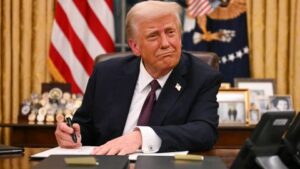
US President Donald Trump announced an increase in previously imposed universal import duties from 10% to 15% on goods supplied to the United States from all countries of the world.
The head of state made the announcement during a speech on trade policy and the protection of national industry. According to him, the decision is aimed at reducing the trade deficit, stimulating domestic production, and bringing jobs back to the American economy.
As Trump noted, the tariff increase will be part of a broader strategy of economic protectionism, which includes revising the terms of international trade and strengthening support for American manufacturers. The administration expects that the new measures will increase the competitiveness of domestically produced goods.
Economists warn that the increase in duties could lead to higher prices for imported goods in the US, as well as retaliatory measures from trading partners. Analysts do not rule out increased tension in world trade and additional pressure on global supply chains.
The new tariff rates are expected to come into effect after the necessary administrative procedures have been completed. Business representatives have already expressed concern about the possible increase in the cost of raw materials and components used by American companies.
Earlier, the US administration introduced a base import duty rate of 10%, explaining this by the need to protect the national economy and reduce dependence on foreign supplies.
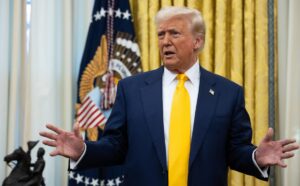
US President Donald Trump hopes to reach an agreement on resolving Russia’s war against Ukraine by fall 2026, linking the desired timeline to the US domestic political calendar, media outlets reported, citing The New York Times.
Earlier, a more immediate deadline of “by early summer” was publicly announced. Reuters, citing The New York Times, reported that the Trump administration is increasing pressure on Kyiv in an attempt to end the war “by early summer.” The deadline “by autumn” is tied to the US midterm elections, which are scheduled for November 3, 2026.
Meanwhile, European intelligence officials commented to Reuters that they were skeptical about the possibility of reaching a lasting agreement as early as 2026 and pointed out that, in their assessment, Russia was not showing any interest in real peace, using the negotiating track to obtain economic and sanctions concessions.
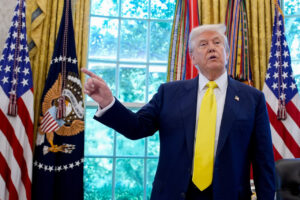
US President Donald Trump signed an executive order declaring a national state of emergency over the actions of the Cuban government, calling the situation an “unusual and extraordinary threat” to US national security and foreign policy.
According to the White House, the executive order also launches a procedure to impose additional duties on goods from countries that sell or otherwise supply oil to Cuba.
According to Reuters, the specific levels of tariffs and the list of countries in the document are not fixed – the decision involves further evaluation by specialized agencies of the United States.
Cuban authorities have publicly condemned Washington’s moves, saying that such measures could hit energy supplies and critical services on the island.
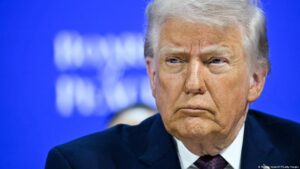
US President Donald Trump announced his intention to raise tariffs on a number of goods from South Korea from 15% to 25%, linking this decision to the fact that, according to him, the country’s parliament had failed to fulfill its obligations under a previously agreed trade agreement. According to Reuters, Trump wrote on social media that the increased rates would apply to South Korean cars, lumber, pharmaceuticals, and other goods subject to “reciprocal tariffs.” However, the report did not specify when the increase would take effect.
The South Korean authorities were taken by surprise by the announcement and declared their commitment to implementing the agreements; emergency consultations were held in Seoul, and relevant officials are preparing to contact the American side.
Against the backdrop of the news, South Korea’s KOSPI index fell during trading, then reversed and closed higher, while the won weakened. Hyundai Motor and Kia shares ended the session lower after a more noticeable decline during the day.
We remind you that under the agreement reached in 2025, the tariff on imports of Korean cars and auto components to the US was previously reduced to 15% from 25% and came into effect on November 1
IMPORTS, SOUTH KOREA, TARIFFS, TRUMP, US
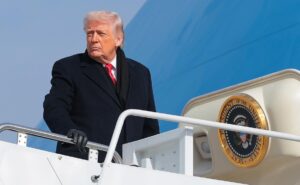
US President Donald Trump said in a speech at the World Economic Forum in Davos that he expects to sign a law regulating the structure of the cryptocurrency market, which will cover Bitcoin in particular, in the near future. According to him, the administration is striving to ensure that the US remains the “crypto capital of the world.” Trump also recalled that he had previously signed the GENIUS Act and added that Congress is working “very diligently” on a new set of rules for crypto assets, which he “hopes to sign very soon.”
Trump’s statements were accompanied by increased volatility in the cryptocurrency market: according to industry publications, Bitcoin initially fell after the comments from Davos, but then partially recovered and returned to levels around $90,000 as investors assessed the signals regarding regulation and the overall news background.
CRYPTO MARKET, DAVOS, LAW, TRUMP, USA
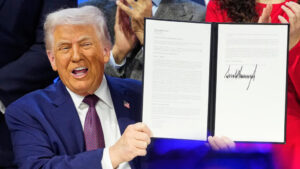
On Thursday, a ceremony was held in Davos to sign the founding documents of a new international initiative by US President Donald Trump, which the American media has dubbed the Board of Peace (in a number of publications – “Council of Peace”). According to media reports, the documents were signed by representatives of Azerbaijan, Argentina, Armenia, Bulgaria, Hungary, Indonesia, Jordan, Kazakhstan, Qatar, Mongolia, the UAE, Pakistan, Paraguay, Saudi Arabia, Turkey, Uzbekistan, and Kosovo.
The ceremony was held publicly and was reported by American media outlets, which published footage and details of the signing of the charter. According to ABC News, the charter establishes an expanded mandate for the structure as an “international organization” that goes beyond a single regional dossier.
It should be noted that Kosovo is a partially recognized state: Serbia does not recognize Kosovo’s independence, declared in 2008, and continues to consider the region its territory (the Autonomous Province of Kosovo and Metohija).